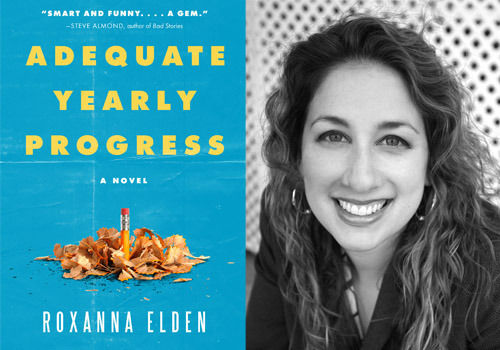3 Lessons a Writing Educator Learned from NaNoWriMo

In addition to the main event every November, NaNoWriMo provides free creative writing resources to educators and young participants around the world through our Young Writers Program. Want to help support our young writers? Donate through our Support a Classroom program!
Today, educator Roxanna Elden shares how leading her students through NaNoWriMo helped her write and publish her own novel:
Dear teachers,
This year’s National Novel Writing Month feels like a bit of an anniversary—doing the classroom-friendly version of the challenge with my students led to the first draft of Adequate Yearly Progress, my recently-released workplace novel about teaching. (It’s like “The Office,” but set in an urban high school.) For years, I’d been bribing high-schoolers to participate each fall, promising them extra credit and pizza parties. Finally, one of them said, “How about you, Ms. Elden? Are you going to write a novel?”
There’s probably no better way to get a teacher to start a writing project.
What I didn’t expect, however, was how much this challenge would change my approach to other pursuits. The experience that started at midnight on November 1, 2009, when I sat in front of my computer still wearing parts of a haphazard Halloween party costume, taught me lessons that would forever influence both my writing and my teaching. Here are a few of them.
1. The sprint-style challenge isn’t just for writing goals.NaNoWriMo’s built-in timeline forced me to bang out an awful draft in one month. When it came time to revise, however, the same approach was still helpful. Each of the nearly thirty rounds of revision started with a short-term deadline on the calendar. Being a teacher helped with this, too. Teachers are busy, but we’re also used to mapping out our time according to the school year’s natural rhythms. Want to mark up a draft before you have to grade midterms? There’s a due date for that. Need to finish a summer rewrite with time to plan for the school year? Hello, mid-August endpoint. Blocking out curriculum milestones can help teachers find time for their own creativity. And it works the other way, too: penciling in creative goals can help teachers plan ahead in more detail.
2. It helps to have a system for capturing ideas—no matter when they hit.A common piece of writing wisdom is that once you’ve started a project, your brain works on it even when you’re not in front of computer. This was especially true as a teacher writing a school-based novel: sparks of ideas came to me unexpectedly, while sitting through a test-prep pep rally, or seeing how students reacted when a cockroach crawled through the classroom. My initial strategy of writing these ideas on sticky notes led to a pile of un-typed notes with no real plan for how to use them. Eventually, I set up a secret email address to use only for book-related ideas. Any time an idea came to me, I’d type it into the subject line of an email and send it to that address, leaving it unopened until I had time to give it my full attention. Later, I started using a similar system to capture teaching ideas. After all, just like writers, teachers have some of their biggest “Aha!” moments at inconvenient times.
3. If you teach language arts, you probably already know how to read like a writer.As an English teacher, I learned to use excerpts of “mentor texts” to help students emulate great writing. Once I started working on my novel I did a more extended version of this, shelving books on Goodreads based on what I admired about them. Not only did this help with the book, it made me feel like the message I’d been repeating to students over the years was actually true: If you pay close attention, you can reverse-engineer much of what you love about another author’s writing. It’s also useful a useful exercise to knock out a rough draft quickly, even on a shorter assignment.
Trying to get students to revise their work thirty times, though? Not so successful.
Roxanna Elden combines eleven years of experience as a public school teacher with a decade of speaking about education issues. Her first book, See Me After Class: Advice for Teachers by Teachers, is a staple in school districts and educator training programs throughout the country. Her recently released workplace novel, Adequate Yearly Progress, captures teaching with humor, insight, and heart.
Chris Baty's Blog
- Chris Baty's profile
- 62 followers



